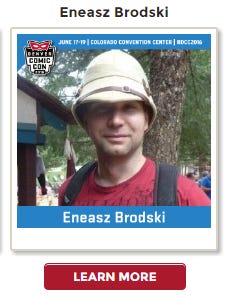Con Panelists

First - I'll be at Denver Comic Con this weekend. You can find me presenting at these two panels, feel free to come up afterwards and talk to me. :) Panel Room Day Time The Writing Process of Best Sellers 506/507 Saturday 1:00 - 1:50 Can't We Get Along? Cultural Exchange vs Appropriation in Writing 506/507 Saturday 4:45 - 5:35
But to the meat:
I go to a lot of panels at lit cons. And I've found that the topic of a panel almost never matters - the important part is the quality of the panelists. If I find a good one, I'll follow them around for a day or two. Cruddy panelists can make the most interesting topic boring, and great panelists can make the simplest panel fascinating. Now that I'm in charge of putting together literary programming for DCC, I'm trying to nudge more people to be better panelists. For that reason, a couple days ago I sent out this email to all our lit panelists. I'm keeping it here for easy reference, so I can send it out again in coming years. But I also think it's good advice for anyone who is going to be on any panel.
When you’re on a panel, you're selling yourself, and not your books. The audience is there to see interesting humans saying interesting things, and interacting with each other in fun ways. They are there to participate vicariously in a conversation. And no one in a real conversation tries to sell their book (or if they do, their friends always groan at this point). Last year Anaea Lay published a fantastic article on this – “On Marketing: Don’t.” – which lays out exactly why this is a bad long-term sales strategy, and how to be more effective while being less overbearing. I highly recommend it.
Of course, we’re all here to expand our audience. At the beginning of each panel, panelists will introduce themselves, and that is a perfect opportunity to mention your current book. Do so then! But afterwards, make the audience like you by giving them what they came to the panel for – an interesting conversation, or informative advice. This doesn’t mean you can’t mention your books at all. If it is relevant to the conversation, please do so. But keep these mentions as supporting details, rather than the focus of what you’re saying. (eg: “When writing I often ask myself, ‘can this character be a woman’? And in the case of Story X I decided yes, and this made the story better because [anecdote demonstrating how story-telling in general is improved, or whatever]") To quote Anaea Lay (from above) “forget your product … sell you. You’re a complete person with a full range of interests and you’re willing to share a part of that with people.”
Be interesting and entertaining. If you are, people will remember you, and seek you out to buy your books. Have you seen actors and directors being interviewed on TV? Do they give plot synopses, and talk about the magic system of the world, and discuss the backstory of the character they played? Or do they talk about what it was like to work on that movie, and the people they met, and things they learned in the process? (It's usually the second one). So talk about the process of writing, not the product of it. Otherwise you're just like the parents that go on for hours about their kids, and everyone is too polite to say how boring that is.









